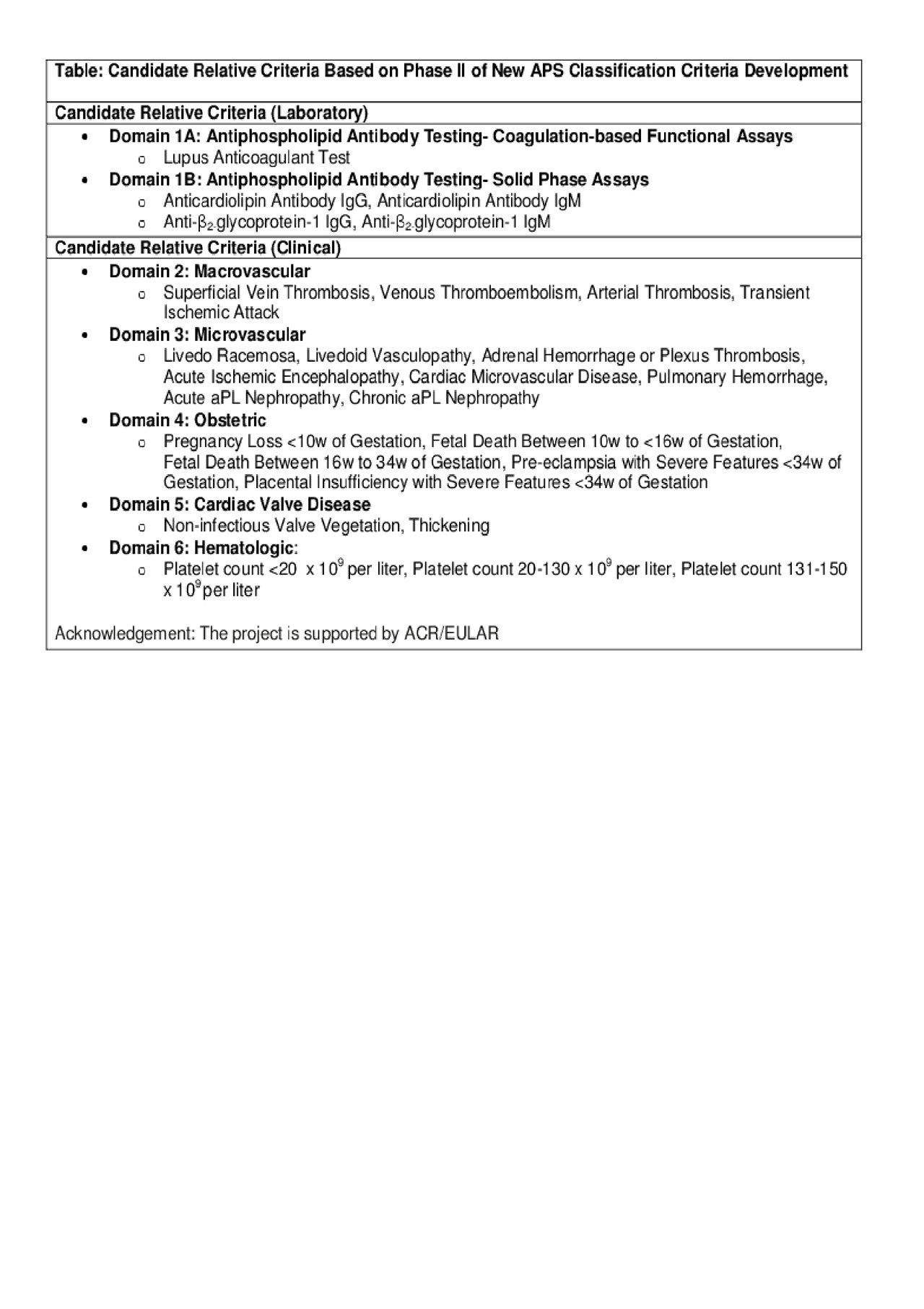Session Information
Session Type: Poster Session (Sunday)
Session Time: 9:00AM-11:00AM
Background/Purpose: An international multi-disciplinary effort is underway to develop rigorous, new, consensus- and evidence-based classification criteria to identify patients with high likelihood of Antiphospholipid Syndrome (APS) for research purposes. The methodological approach includes four phases: item generation (I); item reduction (II); item weighting and threshold identification (III); and criteria refinement and validation (IV). Phase II aimed to reduce items generated in Phase I to approximately 30 items considered most important for distinguishing APS from other conditions. We previously reported the initial item reduction results reducing 261 Phase I items to 64 high specificity items (Barbhaiya et al., Arthritis Rheumatol. 2018; 70 [suppl 10]); here we report overall Phase II results.
Methods: We surveyed the APS Classification steering committee by asking members to rank the 64 previously identified items, using a Likert scale (-5 to +5), based on how specifically each item differentiates APS from other similar conditions (survey A). We ranked each item by mean (+SD) survey score and grouped highest scoring items into independent logical domains (Table). During a face-to-face steering committee meeting, we eliminated low specificity items (score < 1); items overlapping or describing similar concepts were combined. We used nominal group technique (NGT) for problem identification, solution generation, and decision-making via teleconferences to further reduce to approximately 30 items. To more precisely define, cluster, and organize items, we formed domain subcommittees to review literature and come to consensus on the definition, reliability, and precision of each potential criterion. Lastly, we surveyed the steering committee to assess proposed entry criteria and the role of provoking risk factors for macrovascular domain outcomes (survey B).
Results: Mean scores of survey A responses (n: 20) ranged between -1.05 to 4.79. Literature reviews, NGT, and subcommittee discussions reduced 64 items to 27 candidate criteria, which we organized into six independent domains (Table). Survey A results also demonstrated different weights for macrovascular domain outcomes with or without “provoking” thrombosis risk factors. Based on survey B results, we eliminated provoking risk factors with low specificity and, depending on the type of macrovascular domain outcome, 72-89% of the committee members agreed with proposed risk factors and definitions. Following a steering committee consensus to use entry criteria to identify the relevant patient population to whom the classification criteria would be applied, 84% voted in survey B in favor of a time restriction between a positive antiphospholipid antibody test and clinical event as an entry criterion for classification.
Conclusion: Twenty-seven candidate criteria for APS classification were retained and organized into six independent domains using Phase II item reduction techniques. In the next phase, these proposed candidate criteria will be used for real-world case collection and further refined, organized, and weighted so that a preliminary threshold for APS classification can be determined.
Acknowledgement: This project is supported by ACR/EULAR
To cite this abstract in AMA style:
Barbhaiya M, Zuily S, Ahmadzadeh Y, Naden R, Costenbader K, Erkan D, Criteria Collaborators O. Development of New International Classification Criteria for Antiphospholipid Syndrome: Phase II Results [abstract]. Arthritis Rheumatol. 2019; 71 (suppl 10). https://acrabstracts.org/abstract/development-of-new-international-classification-criteria-for-antiphospholipid-syndrome-phase-ii-results/. Accessed .« Back to 2019 ACR/ARP Annual Meeting
ACR Meeting Abstracts - https://acrabstracts.org/abstract/development-of-new-international-classification-criteria-for-antiphospholipid-syndrome-phase-ii-results/

